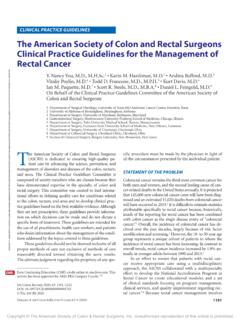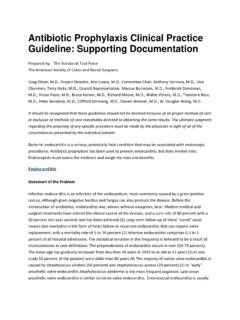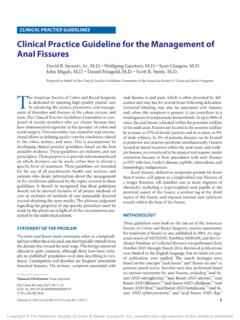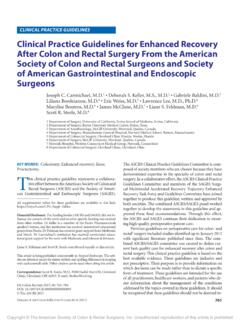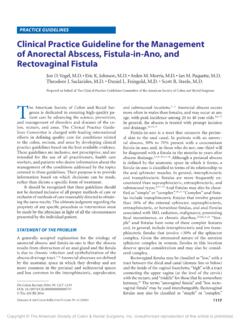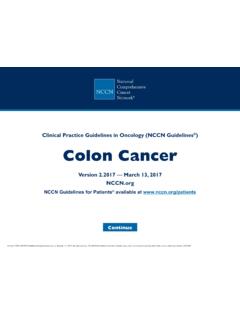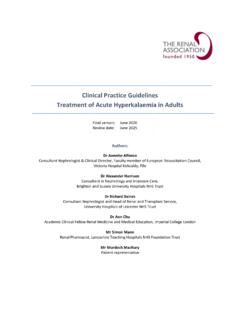Transcription of The American Society of Colon and Rectal Surgeons Clinical ...
1 Copyright The American Society of Colon & Rectal Surgeons , Inc. Unauthorized reproduction of this article is OF THE Colon & RECTUM VOLUME 60: 10 (2017) The American Society of Colon and Rectal Surgeons is dedicated to ensuring high-quality patient care by advancing the science, prevention, and manage-ment of disorders and diseases of the Colon , rectum, and anus. The Clinical Practice guidelines Committee is com-posed of Society members who are chosen because they have demonstrated expertise in the specialty of Colon and Rectal surgery. This committee was created to lead inter-national efforts in defining quality care for conditions re-lated to the Colon , rectum, and anus. This is accompanied by developing Clinical Practice guidelines based on the best available evidence. These guidelines are inclusive and not prescriptive.
2 Their purpose is to provide information on which decisions can be made, rather than to dictate a specific form of treatment. These guidelines are intended for the use of all practitioners, health care workers, and patients who desire information about the management of the conditions addressed by the topics covered in these guidelines . It should be recognized that these guidelines should not be deemed inclusive of all proper methods of care or exclusive of methods of care reasonably directed to obtaining the same results. The ultimate judgment regard-ing the propriety of any specific procedure must be made by the physician in light of all the circumstances presented by the individual OF THE PROBLEMIn the United States, an estimated 96,000 and 38,000 new cases of Colon and Rectal cancer will be diagnosed in Colorectal cancer is the third most common cancer and cause of cancer death in both men and women in the Unit-ed States.
3 The treatment of patients with Colon cancer is largely guided by stage at presentation, emphasizing the importance of a comprehensive strategy of diagnosis, eval-uation, and treatment. Surgery encompasses the primary form of treatment for Colon cancer, whereas chemother-apy is used most commonly in the adjuvant setting. The 5-year overall survival for patients with localized, regional, and metastatic Colon cancer is 91%, 72%, and 13%.2 The scope of this guideline is to address the issues re-lated to the evaluation and treatment of patients who have been diagnosed with Colon cancer. Matters pertinent to Colon cancer screening and surveillance after Colon cancer treatment,3 as well as Rectal cancer,4 are addressed in sepa-rate guideline is based on the previous parameter pub-lished in An organized search of MEDLINE, EM-BASE, and the Cochrane Database of Collected Reviews was performed for the period of January 1, 1997 to April 21, 2017.
4 The complete search strategy is included as an appendix ( ). In brief, a total of 16,925 unique journal titles were identified. Initial review of the search results resulted in exclusion of 11,204 titles based on either irrelevance of the title or the jour-nal. Secondary review resulted in exclusion of 5,480 titles considered irrelevant or outdated. A tertiary review of the remaining 241 titles included assessment of the abstract or full-length article. This led to exclusion of an additional 30 titles for which similar but higher-level evidence was avail-able. The remaining 211 titles were considered for grading of the recommendations. A directed search of references The American Society of Colon and Rectal Surgeons Clinical Practice guidelines for the Treatment of Colon CancerJon D. Vogel, Cagla Eskicioglu, Martin R.
5 Weiser, Daniel L. Feingold, Scott R. Steele, by the Clinical Practice guidelines Committee of The American Society of Colon and Rectal SurgeonsDis Colon Rectum 2017; 60: 999 1017 DOI: The ASCRS 2017 Supplemental digital content is available for this article. Direct URL ci-tations appear in the printed text, and links to the digital files are pro-vided in the HTML and PDF versions of this article on the journal s Web site ( ).Financial Disclosures: None : Scott R. Steele, , Chairman, Department of Colorectal Surgery Cleveland Clinic, Professor of Surgery Case Western Reserve University School of Medicine, 9500 Euclid Ave/A30, Cleveland, OH 44195. E-mail: PRACTICE GUIDELINESC opyright The American Society of Colon & Rectal Surgeons , Inc. Unauthorized reproduction of this article is ET AL: TREATMENT OF Colon CANCER1000embedded in the candidate publications was performed.
6 Emphasis was placed on prospective trials, meta-analyses, systematic reviews, and practice guidelines . Peer-reviewed observational studies and retrospective studies were in-cluded when higher-quality evidence was insufficient. The final source material used was evaluated for the method-ological quality, the evidence base was examined, and a treatment guideline was formulated by the subcommittee for this guideline. A final grade of recommendation was assigned using the Grades of Recommendation, Assess-ment, Development, and Evaluation (GRADE) system (Table 1).6 When agreement was incomplete regarding the evidence base or treatment guideline, consensus from the committee chair, vice chair, and 2 assigned reviewers de-termined the outcome. Members of the American Society of Colon and Rectal Surgeons (ASCRS) practice guidelines committee worked in joint production of these guide-lines from inception to final publication.
7 Recommenda-tions formulated by the subcommittee were reviewed by the entire Clinical Practice guidelines Committee. Final recommendations were approved by the ASCRS Clinical guidelines Committee and ASCRS Executive Committee. In general, each ASCRS Clinical Practice Guideline is up-dated every 5 and Risk Assessment1. An assessment of disease-specific symptoms, past medical and family history, physical examination, and serum CEA level should typically be evaluated in pa-tients with Colon cancer. Grade of Recommendation: Strong recommendation based on low-quality evi-dence, , familial, and hereditary types of Colon cancer account for approximately 65%, 30%, and <5% of new cancers in the United Although often asymptom-atic, Colon cancer may also be heralded by symptoms of fatigue, blood in the stool, abdominal pain, or obstructive symptoms.
8 These symptoms often correlate with more ad-vanced stages of Colon cancer and may be used to compli-ment the information that is subsequently gained during the process of staging the cancer and planning treatment. Comorbid conditions should be assessed to help deter-mine operative risk and to identify opportunities for med-ical optimization before Colon surgery. A careful history, including family history and Colon cancer-specific history can guide the surgeon to suspect hereditary cancer syn-dromes, look for associated pathology or metastatic dis-ease, and initiate additional workup such as mutational analysis. Patients meeting Clinical criteria for or having family history of an increased susceptibility to colorec-tal cancer should be referred to a genetics counselor for formal evaluation, when possible, and consideration of genetics testing, because the results may impact surgical decision making.
9 Physical examination should include as-sessment for an abdominal mass lesion, adenopathy, or surgical scars, all of which may influence diagnostic and treatment-related decisions. Selective rather than routine use of preoperative laboratory testing such as complete blood count, liver function tests, and coagulation studies are recommended for the evaluation of new patients with Colon ,9 Carcinoembryonic antigen levels should typically be assessed before elective surgery for Colon can-cer to establish a baseline value and during the surveillance period to monitor for signs of recurrence. A multivariate analysis of over 130,000 patients included in the National Cancer Database recently indicated that preoperative CEA is an independent predictor of overall survival in patients with stage I to III Colon Although higher CEA levels are generally associated with advanced cancer stage, conflicting evidence on the independent predictive value of this test should be 142.
10 When possible, patients with presumed or proven co-lon cancer should undergo a full colonic evaluation with histologic assessment of the colonic lesion before treatment. Grade of Recommendation: Strong recom-mendation based on low-quality evidence, possible, the histologic diagnosis of Colon cancer should be confirmed before elective surgical resection be-cause nonneoplastic processes such as diverticulitis or IBD may be associated with the endoscopic or radiographic ap-pearance of Colon cancer. Lesions concerning for malig-nancy, but without histologic confirmation (eg, possible sampling error), that are not amenable to endoscopic re-moval warrant oncologic resection. When feasible, com-plete evaluation of the colorectal mucosa is typically advised before surgery to detect synchronous cancers, which were recently reported to be present in 4% of 2400 patients with stages I to III sporadic Colon Com-plete examination of the colorectal mucosa is also impor-tant to identify synchronous adenomas that are present in 30% to 50% of ,17In patients with Colon cancer who have an endo-scopically obstructing lesion or another reason for which complete colonoscopy was not performed, complete pre-operative mucosal examination may be accomplished via a second attempt at conventional colonoscopy, CT colo-nography, or Colon capsule endoscopy.

